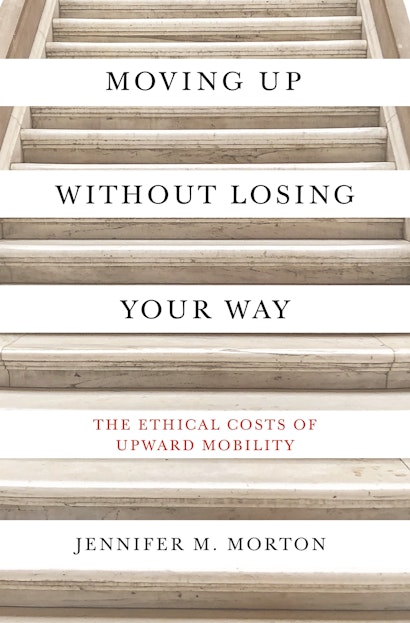Upward mobility through the path of higher education has been an article of faith for generations of working-class, low-income, and immigrant college students. Yet very little attention has been paid to the deep personal compromises such students have to make as they enter worlds vastly different from their own. Measuring the true cost of higher education for those from disadvantaged backgrounds, Moving Up without Losing Your Way looks at the ethical dilemmas of upward mobility.
Drawing upon philosophy, social science, personal stories, and interviews, Jennifer Morton reframes the college experience, factoring in not just educational and career opportunities but also essential relationships with family, friends, and community.
What led you to write this book?
JMM: Although I’m Latina, an immigrant, and the first person in my family to go to college, it wasn’t until I started teaching at the City College of New York that I really started to think about education for upward mobility as an ethical issue. Over thirty percent of City University of New York students come from families that make less than $20,000 a year, and over forty percent of them are the first in their family to go to college. For many of our students, CUNY is the path to upward mobility.
I recognized some of the challenges my students faced as they arrived onto campus; I had also had to navigate college as a place with its own foreign, unspoken rules, with little guidance from my family. But my students have to overcome many more difficult hurdles than I did in their path. Their families and friends often need financial help or for someone to lend them a hand with childcare or eldercare. Though most of my students want to succeed at college, they also want to be there for those they love. For many, doing well in college often involves making painful sacrifices in those important areas of their lives. They feel torn. It is this dimension of their experience that I thought was missing from the conversation.
What do you mean when you say that first-generation students face “ethical costs” as they pursue upward mobility through education?
JMM: Strivers, the name I give those students who are seeking upward mobility through education, are caught between two worlds—the one in which many of them have their most meaningful and valuable relationships to family, friends, and others in their community, and the world they hope to enter, in which educational opportunities and well-paying careers reside. Joining the communities in which opportunities reside can involve the distancing and fraying of those meaningful, early relationships. I call these costs ethical because they concern what, for most of us, are central sources of meaning and value. It is important to keep in mind that these ethical costs are borne not just by the student, but also by those with whom they have those meaningful relationships.
Why doesn’t the traditional narrative of upward mobility acknowledge these costs? How does your training as a philosopher helped you see students’ experiences differently?
JMM: The traditional narrative of upward mobility is aspirational: it is meant to motivate you to pursue an indeterminate better future. For many first-generation college students, that goal is quite hazy. Many of the people they grew up with might not have college degrees or the kind of jobs that those degrees make possible. Consequently, one might think it is better for the students themselves if they are left in the dark about the full extent of the sacrifices ahead of them. We might worry that if they knew what the costs were, they would decide not to pursue college.
I disagree. I think it is important to have an honest narrative. In the first instance because as a philosopher I care about truth for its own sake, but also because being clear-eyed about the ethical nature of the path ahead of us allows us to make choices that speak for what we value and care about. I think most of our students also care about truth and about making their own reflective, well-informed choices.
What can colleges do to better prepare and support students who are facing steep ethical costs? And what can individual professors do?
JMM: I argue that the costs that students face cannot be made whole by the financial and educational gains that a college degree affords. The loss of a relationship with a family member or a close friend is not easily replaced by gaining in other valuable aspects of one’s life.
However, I do think that colleges and professors can play a role in mitigating these costs by helping strivers develop new meaningful and valuable relationships in the communities they’re joining. One of the most common experiences for strivers is feeling out of place in college and having a hard time making friends. We know from the research that the social world of college tends to replicate the segregation that we see in the broader society. Many colleges, who can afford to do so, are engaged in initiatives to address this issue. But professors can do a lot more in their own classrooms. A classroom in which the professor lectures is one in which students do not get to know their peers, even though this might be one of the few spaces on campus in which students have the opportunity to interact across racial, class, and other boundaries. Professors should use the power they have to facilitate this sort of interaction in their classes.
Many elite colleges and universities are beginning to recognize and respond to the particular challenges that first-generation students face. What do popular discussions of first-generation college experiences miss when they focus only on elite institutions?
JMM: An idea that pervades popular discussions of inequality in higher education is that the best thing we could do to fix the system is to make it more likely that talented working-class kids attend Harvard. People are outraged that celebrities and the wealthy are buying their way into elite institutions. But the truth is that schools like CUNY, as Raj Chetty’s research shows, do a remarkably good job at educating working-class students, and educate many more of them than places like Harvard or Princeton.
Many administrators and professors at CUNY understand the unique challenges of serving that student population because we have years of experience doing so. What we are missing are resources. I can do so much more for my students when I have a 20-person class in which I get to know each student, but that is almost impossible with the budget crisis we’re under. The inequality we should worry about in higher education is between institutions. The schools that serve the most vulnerable students are chronically underfunded. This is true in the K-12 system and it is increasingly true in higher education.
What’s the one thing you’d like readers to take away from this book?
JMM: I hope that those who read the book come away with a more subtle appreciation of how ethically difficult it is for strivers to navigate the tricky set of demands they confront in the path of upward mobility. We put students in impossible situations where they feel that no matter what choice they make, they are sacrificing something of value. But, more importantly, I hope that the argument I have put forward in the book makes readers skeptical of upward mobility as a model for addressing injustice. In a society like ours in which opportunities are segregated and concentrated in some communities and disadvantages in others, upward mobility will involve serious ethical losses for those who leave and for those who stay. These losses should concern us all because they serve to erode an important aspect of what makes human lives meaningful and valuable.
Jennifer M. Morton is associate professor of philosophy at the City College of New York and the Graduate Center, CUNY and senior fellow at the Center for Ethics and Education at the University of Wisconsin–Madison.

